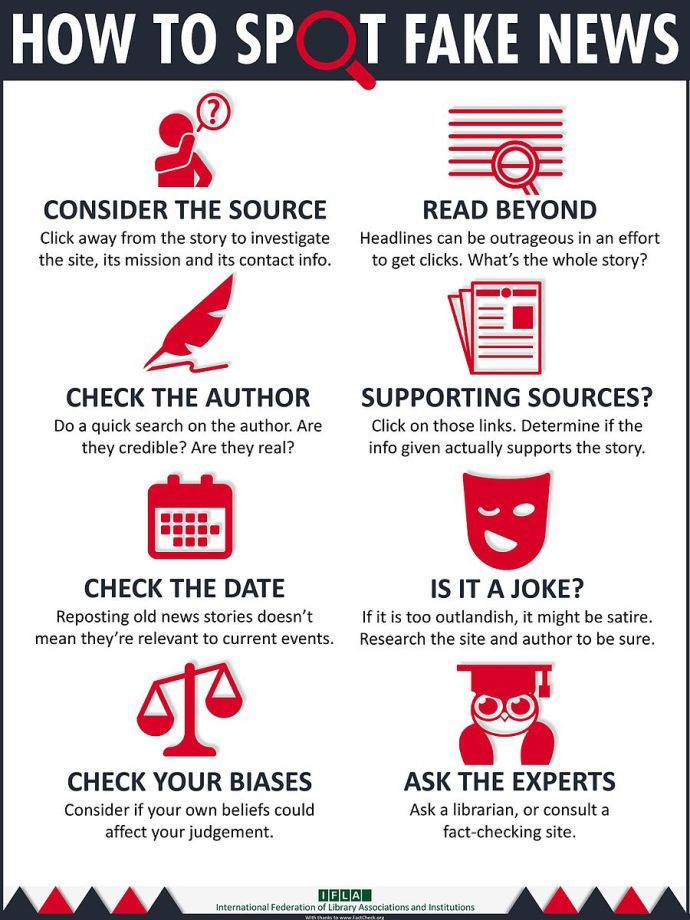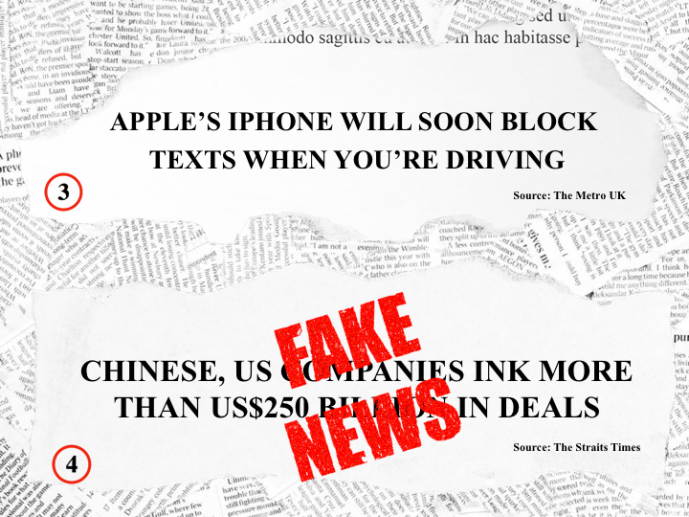HA! Did you look at my heading for another second and went, NO WAY!
That’s right! People who knew these brands will know this is fake news because Apple and Samsung are the biggest rivals and a merger is impossible.
Here’s a simple exercise for you, which one of these headlines is fake news? (Scroll down for answer)

Fake news exercise created by me
Here’s the answer:

Fake news exercise created by me
Real story was Trump followed PM Abe’s lead and poured the whole box of food into the pond. CNN was accused of altering the video to create “fake news” (Agence France-Presse, 2017). North Korean media called Trump a “hideous criminal” and published that he deserved death penalty for his insulting comments towards their leader (The Guardian, 2017).
According to Futurelearn, here are some ways data could be inaccurate:

Infographics created by me. Source: FutureLearn
Fake news are sensationalised information disseminated under the disguise of news reporting (Collins Dictionary, 2017). The term “fake news” has become increasingly common during the past year (Trend Micro, 2017). Buzzfeed was found to be the least and The Economist, the most trustworthy news sites (Pew Research, 2014).

However, I’ve found some tips to how you can identify fake news:

Source: International Federation of Library Associations and Institutions
“Fake news” takes other forms as well:

Source: Media Matters For America
If these steps are too difficult for you, let Ellen Degeneres teach you how to identify fake news!
Source: TheEllenShow
Now that you have been educated on how to spot fake news, here’s another exercise for you. Which one of these is fake news? (Remember the tips mentioned above!)

Fake news exercise created by me
Here’s the answer:

Fake news exercise created by me
Apple will soon release “Do Not Disturb while Driving” service to curb driving offences involving mobile phone usage (The Metro UK, 2017). For news no. 4, most of the deals are just expressions of interest, projects already underway and aspirational arrangements that will never be realised (The South China Morning Post, 2017)
I love reading fake news because they are hilarious but sometimes I do fall prey to fake news. Hopefully through this module, I would be able to evaluate what’s real and what’s not!
(296 words)
Regards,
Jocelyn Goh.
Sources:
Apple’s iPhone will soon block texts when you’re driving – here’s how it works (2017). Metro.co.uk. Retrieved from http://metro.co.uk/2017/06/06/apples-iphone-will-soon-block-texts-when-youre-driving-heres-how-it-will-work-6689406/
Data Literacy – Learning in the Network Age – University of Southampton. (2017). FutureLearn. Retrieved from https://www.futurelearn.com/courses/learning-network-age/3/steps/263023
Ellen Explains Facts & Fake News with Fruit. (2017). YouTube. Retrieved from https://www.youtube.com/watch?v=oi8YVrUfvFU
Fake news, propaganda and the Internet: How trust is being broken online. (2017). Channel NewsAsia. Retrieved from http://www.channelnewsasia.com/news/technology/fake-news-propaganda-and-the-internet-how-trust-is-being-broken-9389932
France-Presse, A. (2017). Trump Dumps Entire Box Of Fish Food Into Pond, Angers Twitter. NDTV.com. Retrieved from https://www.ndtv.com/offbeat/donald-trump-dumps-entire-box-of-food-into-pond-angers-twitter-1771634
How To Spot Fake News. (2017). International Federation of Library Associations and Institutions. Retrieved from https://www.ifla.org/files/assets/hq/topics/info-society/images/how-to-spot-fake-news_440px.jpg
Mitchell, A., Gottfried, J., Kiley, J., & Matsa, K. (2014). About the Study. Pew Research Center’s Journalism Project. Retrieved from http://www.journalism.org/2014/10/21/about-the-study-2/
North Korea ‘sentences Trump to death’ for insulting Kim Jong-un. (2017). the Guardian. Retrieved from https://www.theguardian.com/us-news/2017/nov/15/north-korea-sentences-trump-to-death-for-insulting-kim-jong-un
PING, C. (2017). Chinese, US companies ink more than US$250 billion in deals. The Straits Times. Retrieved from http://www.straitstimes.com/asia/east-asia/boeing-signs-s50-billion-in-commercial-deals-in-china
Trend Micro (2017). The Fake News Machine How Propagandists Abuse the Internet and Manipulate the Public. Retrieved from https://documents.trendmicro.com/assets/white_papers/wp-fake-news-machine-how-propagandists-abuse-the-internet.pdf
Trump’s US$250 billion of deals with China is ‘fake news’. (2017). South China Morning Post. Retrieved from http://www.scmp.com/business/article/2119969/trumps-us250-billion-deals-china-fake-news-best
Understanding The Fake News Universe. (2016). Media Matters for America. Retrieved from https://www.mediamatters.org/research/2016/12/15/understanding-fake-news-universe/214819

Hi Jocelyn, interesting headline you have there, I suppose I got ‘click-baited’ here! In the ‘trust level of news sources by ideological group’ picture, it shows that CNN is ranked amongst the top 10 trusted media company. However in your previous paragraph, it was mentioned that CNN was accused of altering the video to create “fake news”. Personally, I perceive CNN as a reputable and trustable media company but now it makes me ponder, can I still trust these sites? Additionally, the pointers you gave on spotting fake news caught my attention too. Understanding these steps will definitely assist me more the next time I try to filter out fake news! Besides individual efforts, do you think the government also has a role to play? Recently I have read an article saying the government will soon be pushing out a new law to regulate news that are posted online.( http://www.todayonline.com/singapore/new-laws-tackle-fake-news-be-introduced-next-year-shanmugam )What’s your view on this? Hope to hear from you soon!
Cheers buddy!
[160 words]
LikeLike
Hey Jennifer! Thanks for the comment! Heh, gotcha!!
In the survey done by Pew Research Center, it was dated 3 years ago, hence data will not be as accurate for today. After Trump became President with many disapproval, the media scene has constantly tried to criticise him and make him look bad. Trump constantly threatened to use his power at the office against news organisations that cross him (Shields, 2017). Given that CNN is an American news channel, and media in America acts as the Fourth Estate, it is not surprising that with eagerness to post updates on Trump, they had altered the video to make him look bad. The controversy did not end there when Trump called out a CNN reporter as “fake news” (Boyer, 2017). This incident did make CNN lose trust to some people as they felt disappointed that CNN had to purposely alter the video and created a wildfire of criticisms over Trump’s behaviour.
But in my opinion, I think that CNN is still a very trustworthy news site, especially if you are not looking for news about Trump!
I honestly think that government has a little part to play in controlling fake news. Fake news are commonly seen on social media or messaging platforms which are hard to trace the original source (TodayOnline, 2017). It will be difficult even with the new law to deter people from posting or spreading fake news online. This situation is the same as concert tickets scalpers, although there are no legislation against it in Singapore, countries like Australia imposed fines on scalpers (WY, 2017). The law did not help with the situation and people still continue to resell their tickets for an exorbitant price.
I feel that the situation with fake news would be similar to controlling scalpers, it will be difficult to stop the root of the problem even with government intervention.
Let me know what you think! 🙂
(300 words)
Sources:
Boyer, D. (2017). Donald Trump calls out CNN reporter as ‘fake news’. The Washington Times. Retrieved from https://www.washingtontimes.com/news/2017/aug/14/trump-calls-out-cnn-reporter-fake-news/
Laws tackling fake news to be introduced next year: Shanmugam. (2017). TODAYonline. Retrieved from http://www.todayonline.com/singapore/new-laws-tackle-fake-news-be-introduced-next-year-shanmugam
Shields, M. (2017). Trump Threatens NBC License, Blasts ‘Disgusting’ Free Press. Bloomberg.com. Retrieved from https://www.bloomberg.com/news/articles/2017-10-11/trump-threatens-nbc-tv-licenses-after-story-on-nuclear-buildup
WY, A. (2017). Steps in place to curb ticket scalping, say agencies. The Straits Times. Retrieved from http://www.straitstimes.com/singapore/steps-in-place-to-curb-ticket-scalping-say-agencies
LikeLiked by 1 person
Hello Jocelyn! I love reading satire news – they’re hysterical!
I agree with you that fake news is increasingly popular , especially with the rise of the internet. It can be weaponized to influence thoughts, decisions and even, affect ones evaluation process. It is indeed very important to have the ability and knowledge to differentiate what is real or not.
In my post, I mentioned that in order to stop fake news from spreading. Users and Organisations have to work together to prevent it from doing so. What are your thoughts on how fake news can be stopped?
LikeLike
Hey Alicia! I know right! Great minds think alike! The “faker” the news is, the funnier it is because it’s so silly!
Honestly, I don’t think fake news can ever be stopped. As mentioned in my reply to Jennifer’s comment, the situation is similar to ticket scalper. It is impossible to make scalpers stop reselling tickets at an exorbitant price. Users and Organisations can work together to prevent the spread of fake news but they will not be able to stop people from creating fake news. In this article by BBC News, it mentioned that Facebook partnered with an independent fact-checking agency to fact check “fake news” on Facebook. However, the issue is these articles could be flagged “fake” by organisations and users. This could cause great problem for the fact-checking agency as people could flag posts even if they are real news. Resources would be wasted on incorrect flagging and still does not stop fake news from spreading. In the article, it also mentioned the best way is to stop creating fake news at all.
Buzzfeed gathered more than 8.7 million shares, reactions and comments on Facebook for their fake news stories on US presidential election campaigns (Parsons, 2017). It is impossible for any organisation or government to stop millions of people from spreading or creating fake news. Researchers from Cambridge believes by “preemptively exposing” people to fake news, readers will begin to develop a resistance to it – they call it the “psychological vaccine”. (Walton, 2017). However, further research could be done to see if this method works over time and not backfired.
As I mentioned in my post, it is important for us to be critical and alert. If we want fake news to be stopped, we need to stop spreading them first.
Cheers,
Jocelyn
(273 words)
Sources:
Parsons, J. (2017). How to stop ‘fake news’ – psychologists have come up with a way to protect us. Mirror UK. Retrieved from http://www.mirror.co.uk/science/how-stop-fake-news-psychologists-9675939
Solutions that can stop fake news spreading. (2017). BBC News. Retrieved from http://www.bbc.com/news/blogs-trending-38769996
Walton, A. (2017). ‘Psychological Vaccine’ May Protect Against Fake News, Alternative Facts. Forbes.com. Retrieved 16 November 2017, from https://www.forbes.com/sites/alicegwalton/2017/01/23/psychological-vaccine-may-protect-against-fake-news-alternative-facts/#6e678f8120ef
LikeLike
Hello Jocelyn again!
Yes i agree with what you said about Fake news being commonly seen on social media or messaging platforms which are hard to trace the original source and it will be difficult even with the new law to deter people from posting or spreading fake news online. However, since government already played their due part in bringing in a new law to punish fake news maker, we, as individual also have our own apart to play right? Besides knowing how to spot fake news, we should also do our part as a responsible web user to not create or help to spread news before ensuring its authenticity. Just my two-cents on this issue, let me know what’s your take on my opinion!
Cheers mate!
[126 words]
LikeLike
That’s right! We shouldn’t add fuel to fire by spreading fake news around creating panic amongst people.
Let’s hope we could be more alert through this module!
LikeLike